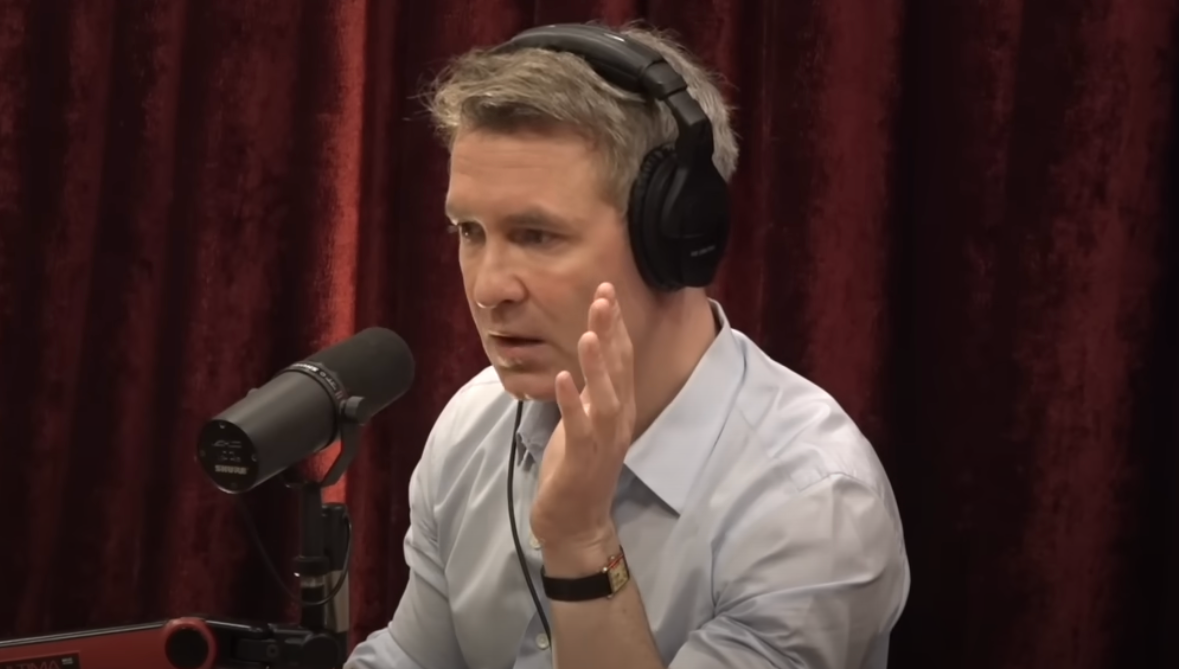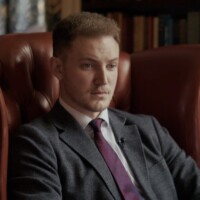Douglas Murray’s clash with Dave Smith on the Joe Rogan Experience has prompted more commentary on the debate itself than on any of the issues that actually brought them to the High Table of bro-world.
This is because most people listen to less than a third of a three-hour podcast and Murray spent most of the first hour trying to define what counts as worthwhile debate. He did so in a way that many, including Smith himself, have attacked as “elitist”. It was only later that the two gentlemen got into the weeds of their main disagreements: Israel-Palestine and Russia-Ukraine. Anyone interested in these questions should watch the full show.
Enjoy independent, ad-free journalism - delivered to your inbox each week
I am more concerned with Murray’s plea, addressed to Rogan in particular, that we preserve genuine expertise amid the collapse of a self-anointed expert class. Murray’s point is that we would be mad to devalue real knowledge in favor of the vulgar speculation that some online actors – though as far as I could tell from the Rogan debate, not Smith himself – view as a kind of heroic martyrdom.
Put like this, it is hard to disagree. Murray’s remarks were only alienating to some viewers because, at times, he appeared to speak of expertise as an accolade that someone can simply be assumed to possess at the outset of debate. What we should in fact demand, it seems to me, is a level of mastery that must be proved in debate.

Murray urges preserving real expertise and proving mastery through debate, not assuming it upfront.
In a higher-trust society, much of this stress-testing would be unnecessary. This is because the institutional standards by which we count expertise as genuine would strike us as a great deal more reliable. Of course, these standards could never serve as a final guarantee of what is true or false. We cannot afford our critical faculties any such indefinite slumber. Nevertheless, they would offer reasonably dependable heuristics – more for when it comes to assessing what is initially plausible or worth our time than for anything else. The fundamental problem is that the institutional setup that gives social reality to the concept of expertise has in our societies been decimated.
Of course, this is not true of all fields. There are areas where it remains a waste of time to engage in an endless prodding match with those who know better. We still get on planes in the belief that the pilots flying them are unlikely to get us killed, as indeed most of us refrain from performing our own dentistry. While the race-communist assault on merit has made it legitimate even in these areas to ask some questions that would once have been unthinkable, we continue to trust that the requisite skills for flying and dentistry have been established in advance of our enlisting the services of any particular airline or clinic. As such, we do not feel the need, and still less the authority, to subject every pilot or dental practitioner to an indefinite process of Socratic questioning before we board an aircraft or consent to an anesthetic.
However, for reasons that Murray himself accepts, there now exist many areas, not least in politics and academia, where a reflexively trusting attitude is the mark of a fool. As far as political, academic, and in many ways even medical life is concerned, we find ourselves in a crisis akin to that in which the sport of boxing would be mired if its regulatory bodies took to awarding professional licenses on the basis of criteria that had strayed wildly from any test of fighting ability. Whoever then wins the World Championship would be able to take pride in being the best boxer among a random set of chumps, but there would be no justification for thinking him truly the champion of the world. The institutional fact “X has been awarded the world heavyweight title” would no longer be identical or even approximate to “among those weighing over 200lb, X is the world’s best boxer”.
Murray’s point should have been – and was perhaps intended to be – that we would be foolish to throw out the concept of expertise simply because certain experts, whether Anthony Fauci or the activists in the corporate media class, have destroyed their credibility. The sensible move, as Murray urged Rogan, is to solicit the contributions of more and better experts. But again, trust having been dented, the problem is that we cannot be sure who these people are in advance.
Presumably, the reason Murray wants the historian Lord Roberts to debate the podcaster Darryl Cooper, whose revisionist take on the Second World War caused controversy last year, is because he believes Roberts would win. The fact that Roberts also holds a History degree from Caius College, Cambridge, has nothing to do with it. After all, Roberts once told me that he was far from the best historian in his year. Only later in life, after a misguided stint as an investment banker that he did us all a service by abandoning, did Roberts start to take the determined scholarly interest in archival history to which his remarkable body of work is a testament. Crucially, it is not the Cambridge degree, but all that he has done since, that makes him so much better today than his former peers.
The fact that Roberts also holds a History degree from Caius College, Cambridge, has nothing to do with it. After all, Roberts once told me that he was far from the best historian in his year. Only later in life, after a misguided stint as an investment banker that he did us all a service by abandoning, did Roberts start to take the determined scholarly interest in archival history to which his remarkable body of work is a testament. Crucially, it is not the Cambridge degree, but all that he has done since, that makes him so much better today than his former peers.
The other important point is that expertise tends to take the form of either technical or practical knowledge. What we might call moral knowledge is less easily achieved or demonstrated. “How do we build a nuclear bomb?” is a different kind of question from “When, if ever, should we use one?” Knowing what it is like to be shot at does not make a soldier who has practical experience of wars justified in pushing for yet more of them in the future.
The moral knowledge with which politics naturally concerns itself is an elusive prize. And since in ethics there are no obvious criteria, there can be no obvious experts – and nothing obviously to be done but to have good-faith debates and then, as in boxing, but with an even more ambiguous rule-book, to decide who we think wins.
A moral philosopher is in this way very different from a medical physician. His expertise is technical and has no necessary practical force. An ordinary member of the public would for the most part be well-advised to take whatever the doctor randomly assigned to him by his health provider prescribes at the end of an appointment. However, he would be right to have doubts if a philosopher equally assigned to him at random claimed in virtue of his credentials to be more qualified than a close friend to tell him how to deal with a particular life challenge. The fact that the philosopher will know more than this friend does about the difference between modal and deontic logic changes nothing. Even a doctor with enough technical and practical know-how to save countless lives over the course of a career does not thereby prove that life is sacrosanct.
It follows that medical physicians like Fauci and experienced soldiers like Senator Dan Crenshaw should not take their respective technical and practical knowledge as conferring automatic moral authority. Knowledge of a disease or a warzone is not the same as knowledge of what morality demands of us in either case. Just because they are experts in some limited sense, doctors who supported lockdowns or generals calling for us to send fighter jets to Ukraine cannot shirk the duty they have to make proper arguments – using as many facts as their knowledge allows them, of course – for these moral positions.
Knowledge of a disease or a warzone is not the same as knowledge of what morality demands of us in either case. Just because they are experts in some limited sense, doctors who supported lockdowns or generals calling for us to send fighter jets to Ukraine cannot shirk the duty they have to make proper arguments – using as many facts as their knowledge allows them, of course – for these moral positions.
Practical and technical knowledge are necessary sources of information in any scenario where practice and technique are relevant. But they are not sufficient for deciding upon a final course of action or even for framing the terms of the question. How should two UFC fighters respond to a third man who claims that prize-fighting is unethical and should be banned? The martial artists do not defeat the man’s objection by boasting that they could send him to sleep with a rear-naked choke. Nor do they do so by demonstrating as much once they feel themselves to be losing the war of words.
The problem is not that expertise is by nature “elitist” (as if that should count against it) or otherwise suspicious. Murray is right to call out anyone reveling in the decline of faith in experts for the sheer fun of the profligacy it makes possible. But since the existence of expertise as a social fact requires institutions, and since our own institutions have lost credibility, we exist in more of a wilderness than was once the case. Murray’s fear is that these conditions can redound as much to the benefit of grifting chancers as genuine visionaries.
Still, there is always some test to be passed. And without institutions that promote and reward the constant renewal of claims to genuine expertise, the best we can hope for is an epistemic war of all-against-all in which brute force and sophistical manipulation are dishonored tactics. Given the alternatives, for the time being we should count ourselves lucky that it is Rogan who hosts the most popular such gladiatorial arena. While far from perfect, he is not only curious and well-motivated, but most fittingly of all an undoubted expert on the art of combat.




Comments (0)
Only supporting or founding members can comment on our articles.